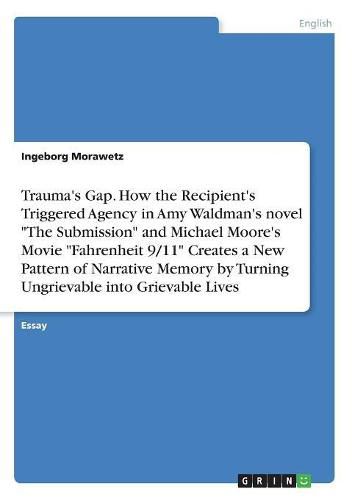Readings Newsletter
Become a Readings Member to make your shopping experience even easier.
Sign in or sign up for free!
You’re not far away from qualifying for FREE standard shipping within Australia
You’ve qualified for FREE standard shipping within Australia
The cart is loading…






Essay from the year 2016 in the subject American Studies - Comparative Literature, grade: 1,3, Leiden University, language: English, abstract: This paper argues that, contrary to politics and news coverage, both Amy Waldman’s novel The Submission and Michael Moore’s movie Fahrenheit 9/11 give the audience the chance to not rationally understand, but to emotionally recognize the other as grievable within the representational gap that is created through the narrated relation of the I to the face . This emotionally recognized narrative of the other can become part of the narrative memory into which traumatic recall should be turned, and therefore also is more successful in the overcoming of trauma’s gap than the public medial narrative. After the attacks on the World Trade Center on September 11th, 2001, two major narratives emerged: The trauma of the US citizens and the defense against the evil other. Both are connected on a psychological and political level. The us vs. them dichotomy, the traumatized good Americans against the evil Muslims, existed before the attacks and was reinforced afterwards. The trauma of the individual American was partly instrumentalized and militarized for political purposes, leading to a perception of the Muslim other not only as evil, but also as ungrievable. Judith Butler discusses the notion of the ungrievable other in her publication Precarious Life. She sees the attacks as a chance to change the political and individual dichotomy of us and the other , and therefore of grievable and ungrievable lives. Butler argues that the recognition of the other (Butler 34-44) could prevent further terrorist attacks and wars by pursuing the notion of a two-sided vulnerability. By using Levinas’ theory of the face she shows how failed representation of and failed identification with the other can lead to experiencing it as grievable by creating a difference or a gap in the relation of it to the self, synonymously the human-being
$9.00 standard shipping within Australia
FREE standard shipping within Australia for orders over $100.00
Express & International shipping calculated at checkout
Essay from the year 2016 in the subject American Studies - Comparative Literature, grade: 1,3, Leiden University, language: English, abstract: This paper argues that, contrary to politics and news coverage, both Amy Waldman’s novel The Submission and Michael Moore’s movie Fahrenheit 9/11 give the audience the chance to not rationally understand, but to emotionally recognize the other as grievable within the representational gap that is created through the narrated relation of the I to the face . This emotionally recognized narrative of the other can become part of the narrative memory into which traumatic recall should be turned, and therefore also is more successful in the overcoming of trauma’s gap than the public medial narrative. After the attacks on the World Trade Center on September 11th, 2001, two major narratives emerged: The trauma of the US citizens and the defense against the evil other. Both are connected on a psychological and political level. The us vs. them dichotomy, the traumatized good Americans against the evil Muslims, existed before the attacks and was reinforced afterwards. The trauma of the individual American was partly instrumentalized and militarized for political purposes, leading to a perception of the Muslim other not only as evil, but also as ungrievable. Judith Butler discusses the notion of the ungrievable other in her publication Precarious Life. She sees the attacks as a chance to change the political and individual dichotomy of us and the other , and therefore of grievable and ungrievable lives. Butler argues that the recognition of the other (Butler 34-44) could prevent further terrorist attacks and wars by pursuing the notion of a two-sided vulnerability. By using Levinas’ theory of the face she shows how failed representation of and failed identification with the other can lead to experiencing it as grievable by creating a difference or a gap in the relation of it to the self, synonymously the human-being